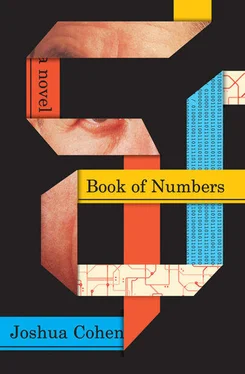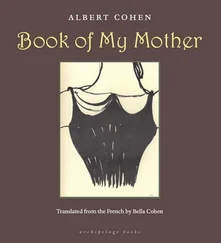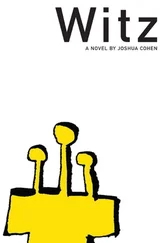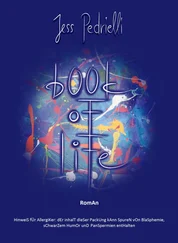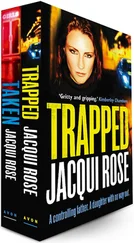Cal, this is not an email I’m ever going to send — this isn’t even a letter, Dear — and anyway I can’t send anything.
Aaron’s kids passed on your ms., and I’ve read it — on trains and then in this “youth pension” I’m in — night after night gutting the manila (postseason joke: the Mets moved to the Philippines and changed their name to the Manila Folders), getting that glue smell and unclipping, unrubberbanding, tracing each line with the clipedge, wrapping the bands around my typing injury wrists nervously because I want it to be brilliant, I want it to be terrible — my competitiveness competing with a weak need to be transported, even entertained.
It’s all I have with me is why, that and a passport that both is and isn’t mine — bookmarking your book by my side, under my head as a pillow — reading it in cafés, museums
The night before, I came back late and the pension was closed — I’d never had the key to the front. I rung the bell labeled HAUSBESORGER, and this ogre Hungarian opened the door a gibbous swing like he’d been standing just behind it polishing the phrase “No One Will Admit Between Hour of Two and Six.” He was stubborn, it must’ve been that hour. So, given that I was already carrying all my possessions in this nifty, recently acquired, green in every sense Amazon.com totebag — because everyone’s a thief — I left,
It’s like my standards are gone with Aar, and I’m not sure what he’s told you, or whether you even wanted me to read your novel — you never asked, and you used to ask, directly — or Aar’s kids just wanted to keep me amused and out of their hair (meaning Lisabeth), or flatter me and so keep me as a client (meaning Seth, who has a nose on him).
But in the event that Bringdom came from you, I’ve been giving it my all. Thorough notes will have to wait, but here:
1. you shouldn’t have a sex scene longer than a page that’s a dream (pp. 99-101),
2. you shouldn’t have a death scene shorter than a page that’s a flashback (p. 250),
3. the war theatricals have all obviously been informed by reporting, but they’re too much in the fact department, the military lingo is too much especially for the abstracted Kafka or like Camus in the Sunni Triangle mood you’re aiming for (let the Weinsteins or The HBO tang up the slang for the next generation of soldiers),
4. because once I was out of Chapter 2—and this is my main point — once Bringdom’s PTSD and debt and failed marriage and failure to engage with his child have been effectively established in “the present,” by which I mean “the topical,” and the novel’s deployed on this death mission account of his past, his enlistment and training, all his ballsdeep macho martyrdom antics (you’ll get a Purple Heart for nonpurple prose under fire), I was doing that guiltily-flip-ahead-to-gauge-how-many-pages-are-left-in-the-chapter thing, the guess-how-many-desert-boring-pages-are-wasted-on-this-already-wasteful-war thing, and was disappointed to find that all of them were (about war), except for the jerking-it-to-the-Kurd-girl-who-turns-into-his-mother-in-the-middle-of-a-soyfield dream, and the maybe-suicide-maybe-not-of-his-father flashback I mentioned above, which though I realize I just warned you not to use flashbacks and dreams, I meant only contextually, because in terms of content this is your truest territory: Home.
(And Rachel-Anne, nice touch — as perduring as the Plains, and as open as the Kmart pharmacy.
I know, I know, she’s not my Rach — she’s your authorial prerogative.)
Anyway, onto your concluding scenes. Rachel-Anne getting that call, and fainting, with all the customers just waiting. That you’ve written it so that readers can only suppose they know what the call’s about, but can never know for sure: it’ll play better with the soundtrack behind it, unison cellos and solo muted horn. That the concerned customer who pats her hand and gives her a plastic poppy is black but is never described that way and it’s only made relevant by her coworker’s racist comment: it’s like I’m reading you sweat. This restraining tendency feels especially unfair with the decision to withhold the baby’s name. Just name the baby, Cal — for me.
There’s more, of course. And more about style. But then you always doubted that, style. Next time, if time and I get squared.
“With compliments and condolences — we have to be in touch” (about how to market what’s basically a male violence novel to females ages 18 to 80 who together are responsible for approx 68 % of all new book buying and approx 64 % of all public library book borrowing in America today) (my stats are reliable),
j
\
P.S. Read this postscript first.
The way I was raised, Cal, from the earliest, was that my mother’s was the only war. That what she experienced (her Yiddish would be vos mikh hot getrofn, “what has befallen me”), being stowed away in that Carmelite convent in southern Poland on the Czechoslovak border and beaten and enslaved, essentially, was worse than anything any other human had ever experienced, but what occurs to me now was that Moms had never insisted on this, Dad had. Only Dad would attempt to exploit her trauma in explanations of her insomnia and bedsoilings and health issues, including, of course, her infertility, or in rationalizing her lateness in picking me up from baseball practice, or in leaving the laundry in the hamper and the pantry bare. This is all to establish that from the very start of planning my book (Moms had agreed to let me interview her, but only after I’d threatened to write about her regardless), I had no impression of my father’s pathologizing as anything other than an expression of his devotion to my mother, a duty that required both uxory and coddling. I’d failed to recognize his denial — abnegation, sublimation, displacement mechanism (I’m the first in my family to ever talk to a shrink) (about anything) — how my father had developed this smothering veneration in order to avoid discussing his own war. It was how he avoided anything even remotely to do with himself.
But the time to return to is 12 years ago, Cal, the research, the writing, Tel Aviv. I sat with my Tante Idit, not my aunt but my mother’s first cousin, interrogating her in the parched garden of the white duplex she shared with her seething companion, a retired Maghrebi army general who resembled King Hussein of Jordan and never once said shalom to me. He blamed me for the crying — Idit was crying all the time. And her brother Menashe was crying, and he was calling his crying sister by her birthname, Yetta, and they were calling Moms by her birthname, Yocha. They answered all my questions sincerely, shamelessly, but with rivalry too — after finding out how selective of an account Moms had given me. 12 goddamned years ago.
And then it was fall already, and I was off like a thief to Poland — to Warsaw. Renting that Daewoo on Moms’s MasterCard and driving it to Sobibór and Majdanek, or what Communist memorials remained of them, to Bełżec, or what Communist memorials remained of it, past the lot that’d been my mother’s house in Kraków, and the convent at Chyżne that’d abused and saved her thanks to luck and her parents’ money and their influence with the Kraków Judenrat, and finally across the cankered karsts of the Tatras in what’d lately been Czechoslovakia, to Vienna — from which I flew back to the States.
I stayed in NY and wrote, and went down to Jersey only to present Moms with my transcripts to confirm or deny, as the intelligencers say — but she just set down the pot she was glazing and made me promise never to print anything the cousins told me, and I agreed, or she said I agreed, and that she trusted me.
Читать дальше
